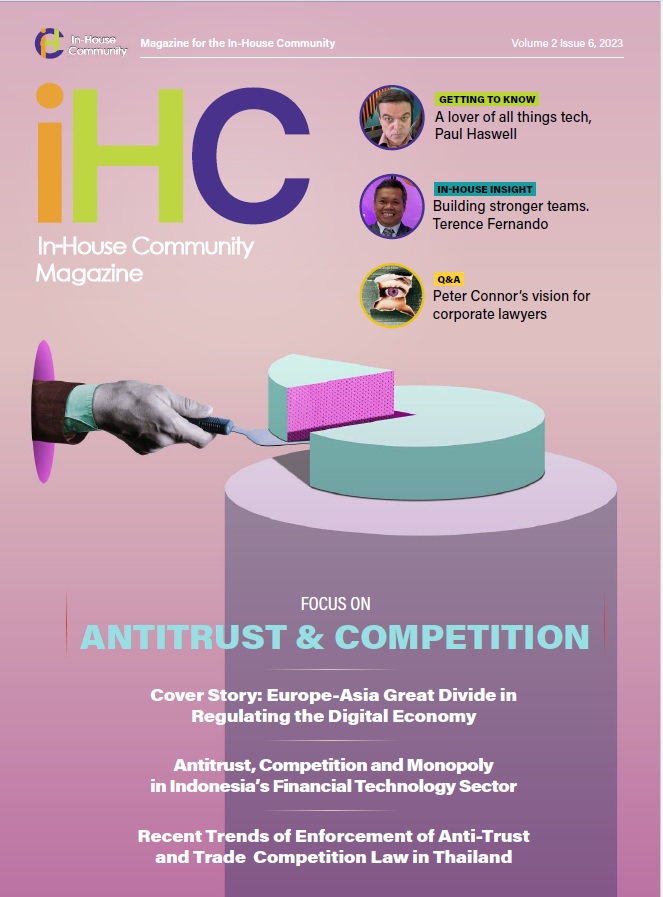PRANAT LAOHAPAIROJ
The Trade Competition Act B.E. 2560 of Thailand (“Act”) was enacted in 2017 and is the second version of the anti-trust and trade competition law in Thailand. Its predecessor is the Trade Competition Act B.E. 2542, which was enacted in 1999 and saw very little usage due to a lack of necessary supplementary regulations and will of the government and the public to put the law to use. During the 18 years of its existence, the 1999 law only saw action a few times, with all of the cases dropped due to lack of evidence or governing support. The Act is the reincarnation of the 1999 law, with most of the provisions transposed from the 1999 law onto the Act almost verbatim, but with minor differences regarding categorisations and re-classifications of penalties and other minor details. The Act was deemed appropriate to change the competition landscape in Thailand in order to promote more holistic competition within the economy and enhance understanding between different stakeholders and the governing authority. The Act is also intended to extinguish, or at least limit, unnecessary hindrances to trade that had (and to some extent nowadays still have) existed because of historical trade practices and unique cultural conduct. These practices and conduct, such as arrangement, exclusivity, resale price maintenance, unfair poaching, cost imposition, have largely been banned in countries that have enacted their version of anti-trust and trade competition law, and Thailand was deemed ready to follow suit.
The Trade Competition Commission of Thailand (“ TCCT ”), which is the governing authority over the Act, was very clear that during the first few years of the Act they would be focusing on disseminating ideas and principles of the Act to the public in order to properly educate the operators about the law and encourage everyone to abide by the law as much, and as soon, as possible. The first few years of education and leniency were followed by gradual enforcement, which has led us to intensified enforcement in 2022 and 2023, as outlined below.
The Act addresses three primary areas of trade competition: 1) merger control and filing; 2) unilateral misconduct by one operator against a trade partner, vendor, customer, etc.; and 3) cartel activities. Although the Act itself has been supplemented by numerous announcements by the TCCT, there are still a myriad of issues within the Act that have yet to be clearly codified. In this regard, the TCCT has allowed the Office of Trade Competition Commission (“ Office ”) to publish cases that have been finally adjudicated or settled by the TCCT for public viewing and understanding.
To date, the Office has published a total of 139 cases, the majority of which concern merger control and procedures, while the minority are about unilateral misconduct, such as unfair trade conditions, exclusivity, and prohibitions. Only seven cases are about cartel arrangement and discussions.
For merger control and procedures, 2022 and 2023 are largely positive years as many precedents have been formed and published for public viewing, and these have cleared up many of the previously ambiguous procedures and scope of coverage of reportability. Almost half of the cases that have been published are examples of filings that were not necessary to be filed under the Act. The precedents have provided a set of corporate and business characteristics that business operators wishing to undertake a merger can review against themselves to see if their merger transaction will need to be filed with the TCCT. In the past, operators often had to consult with the Office on a case-by-case basis regarding whether their merger transaction needed to be filed. Now, operators should be able to review their own circumstances and come up with a clearer answer. Despite this positive development, the operators must also be mindful that the TCCT and the Office have been much more active and assertive. So far, based on available information and precedents, six merger transactions have been investigated, and their responsible parties have been fined in the last two years. Although the fines are not financially debilitating compared to fines levied by relevant authorities in other jurisdictions, their existence serves as a reminder that the TCCT and the Office are taking unfiled merger transactions very seriously. More notable is the fact that half of the fined transactions were involuntarily discovered by the authority. This means that the TCCT and the Office have sufficiently morphed from largely passive regulatory bodies, waiting for complaints during their early years, into active players who seek out information from both conventional sources, such as news and business reports, and unconventional sources, such as complaints and whistle-blowers. This conclusively means that operators planning to undertake any merger transaction with effect in Thailand need to be more vigilant and, if possible, abide by the requirements of the Act to avoid investigation by the Office and the TCCT. In particular, offshore operators need to bear in mind that even though the Act itself may not have the practical force to reach beyond Thai borders and capture any breaching offshore operators and bring them back to face their scrutiny in Thailand, it is best not to upset the TCCT, as they have absolute discretion to undertake investigation of any business. This means that the offshore operators’ Thai operations can be put under the TCCT’s radar and face future risks if their offshore parents decide to blatantly breach the requirements of the Act. Furthermore, it may be difficult for management of any offshore entity to have to explain internally and to their shareholders why there is a pending fine in Thailand, regardless of whether such fine can really be applied against the company.
This means that the offshore operators’ Thai operations can be put under the TCCT’s radar and face future risks if their offshore parents decide to blatantly breach the requirements of the Act
For unilateral misconduct, 2022 and 2023 saw only a handful of cases, and the trend of enforcement is on a gradual incline. However, the authority focused their efforts on digital platforms, specifically food and product delivery applications, and franchises. The authority even announced that there have been numerous complaints from restaurants and partner-riders, where their rates of compensation have been unfairly reduced and business opportunities unfairly restricted, and that the TCCT and the Office would focus their efforts on discussion with, and investigation of, these mega-platforms. A few precedents concerning these platforms have been issued in 2022 and 2023, but none resulted in any prosecution or fine, as lack of evidence from the complainants necessitated the TCCT to drop many cases.
Other cases not concerning digital platforms have also been dropped due to lack of clear evidence of monetary impact on the complainants, or insufficient severity of misconduct. This provides two valuable lessons for us. We now know that the TCCT is generally exceptionally conservative in its prosecution, and perhaps rightly so, as any case that does not contain strong evidence will likely be dropped instead of being dragged out for more investigation. On the other hand, hindered operators need to maintain immaculate records of operations, and such must include unequivocal evidence of commercial and monetary impact caused by the misconduct of a trade partner, or their case will not be properly entertained by the TCCT and the Office. Although most cases have been dropped, their preliminary investigations serve to remind all operators that the TCCT and the Office are ramping up their efforts at investigation and ensuring legal compliance. Operators are reminded that it is perhaps more economically sensible to strictly abide by the Act’s requirements rather than risk facing expensive and possibly lengthy investigation by the TCCT and the Office.
The trend of enforcement for cartels is somewhat different from those of the first two areas of law. Discussions and arrangements between direct competitors were historically prevalent within the Thai economy, and to some extent continue to happen even nowadays. The Act was enacted partly to combat this anti-competitive behavior, which has an immense negative impact on end-users and business operators, as well as unknowingly inhibiting the ability of business operators who engage in any particular cartel activity to improve their operation, as there would be less need for such operators to improve their products, services, and technology.
Since its inception, the Act has been used to deal with numerous cases within the merger control and unilateral misconduct areas, but the number of cases involving cartel activities is comparatively small. The actual number of cartel cases that went through the investigatory process of the Office remains confidential, but so far only seven cases involving cartel activities have been published for public review, compared with numerous cases for merger control and unilateral misconduct. Out of these seven cases, only one ended with an actual fine against the participants, while others were simply dropped because there was lack of unequivocally clear evidence that a cartel was established. Useful examples are cases that involved publication of prices by nationally recognised trade associations.
Although the TCCT recognised that some of these prices have been followed by the association members on certain occasions, the lack of routine adherence and mechanism of enforcement against deviation played a major role when the TCCT decided that there was not enough evidence to pursue the involved parties. This appears to be a lenient approach when compared to enforcement in other jurisdictions, but it may stem partly from the intention to slowly ease the public into the law. Despite a low number of case precedents for cartel activities, operators should be mindful that breach of cartel regulation is generally more products, services, and technology. Since its inception, the Act has been used to deal with numerous cases within the merger control and unilateral misconduct areas, but the number of cases involving cartel activities is comparatively small.
The actual number of cartel cases that went through the investigatory process of the Office remains confidential, but so far only seven cases involving cartel activities have been published for public review
The actual number of cartel cases that went through the investigatory process of the Office remains confidential, but so far only seven cases involving cartel activities have been published for public review, compared with numerous cases for merger control and unilateral misconduct. Out of these seven cases, only one ended with an actual fine against the participants, while others were simply dropped because there was lack of unequivocally clear evidence that a cartel was established. Useful examples are cases that involved publication of prices by nationally recognised trade associations. Although the TCCT recognised that some of these prices have been followed by the association members on certain occasions, the lack of routine adherence and mechanism of enforcement against deviation played a major role when the TCCT decided that there was not enough evidence to pursue the involved parties. This appears to be a lenient approach when compared to enforcement in other jurisdictions, but it may stem partly from the intention to slowly ease the public into the law. Despite a low number of case precedents for cartel activities, operators should be mindful that breach of cartel regulation is generally more serious than committing unilateral misconduct (unless you are a dominant player in any market) or breaching a merger filing requirement. A cartel activity, if and once properly proven, may carry a term of imprisonment. Furthermore, despite the fact that tangible results of a cartel discussion play an important role within the decision-making process of the TCCT when adjudicating the case, cartel activities are much more clear-cut than other types of misconduct and can be more easily adjudicated against when discovered.

Overall, 2022 and 2023 have seen many developments within the area of anti-trust and trade competition within Thailand. Rules have been promulgated and interpretations outlined to the public, thus making it easier to delineate the line between compliance and non-compliance. We expect the TCCT and the Office to issue more precedents in the coming months to continue to supplement merger control regulation and unilateral misconduct to enable the public to navigate the terrain more safely and smoothly, as there are still some areas that remain somewhat unclear.

Pranat Laohapairoj, Partner, Chandler MHM
Pranat has worked with Thai and international clients on merger and acquisitions, anti-trust, corporate, anti-corruption, compliance, and data protection, providing advice and services involving due diligences, deal structuring, negotiation, contract drafting, deal execution, in-house training and public seminars.


